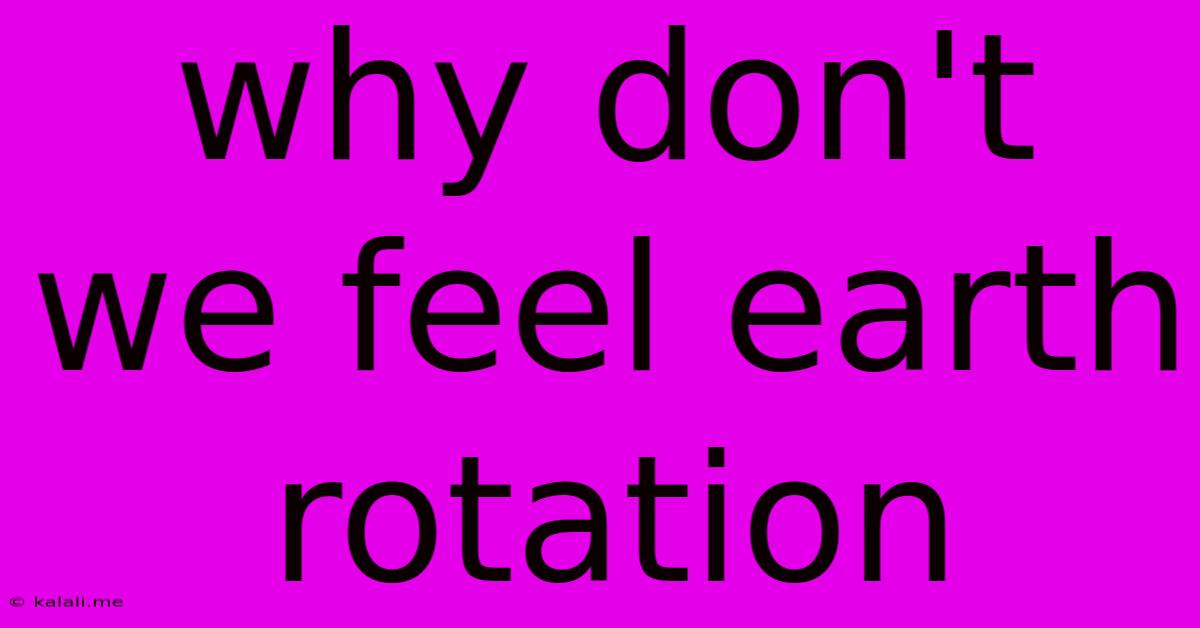Why Don't We Feel Earth Rotation
Kalali
Jun 05, 2025 · 3 min read

Table of Contents
Why Don't We Feel the Earth Rotating? A Journey into Physics and Perception
Have you ever wondered why, despite spinning at an incredible speed, we don't feel the Earth rotating? It's a question that sparks curiosity and highlights the fascinating interplay between physics and our perception of the world. This article delves into the science behind this phenomenon, explaining why we experience stillness despite the Earth's constant motion.
The Earth rotates on its axis once every 24 hours, completing a full circle at approximately 1,000 miles per hour (1,600 kilometers per hour) at the equator. That sounds incredibly fast, yet we remain blissfully unaware of this rapid spin. The reason lies in the concepts of inertia, constant velocity, and our relative perception of motion.
The Power of Inertia: Staying Put in Motion
Inertia, a fundamental principle in physics, dictates that an object in motion tends to stay in motion unless acted upon by an external force. This is crucial to understanding why we don't feel the Earth's rotation. We, along with the atmosphere and everything else on Earth, are all moving at the same speed as the planet. We are all participating in this rotation, and thus, experience no acceleration relative to the Earth itself. There's no force pushing or pulling us in a different direction, hence we don't feel the motion. Think of it like being on a smoothly sailing ship – you only feel the motion if the ship changes speed or direction (acceleration).
Constant Velocity: The Steady Spin
The Earth's rotation is remarkably consistent. It's not speeding up or slowing down dramatically. This constant velocity is key. We only perceive motion when there's a change in velocity – acceleration. A constant, uniform motion, like the Earth's rotation, is imperceptible to us. This is similar to being on a plane at cruising altitude; the smooth, constant speed makes you feel as if you're stationary.
Relative Motion: Our Perspective Matters
Our perception of motion is always relative. We perceive motion based on our movement relative to our surroundings. Since everything on Earth, including the atmosphere, is rotating together, we have no reference point to perceive this motion. If you were suddenly transported to space and could look down at the Earth, you would undeniably see its rotation. But here on Earth, our surroundings move with us, creating a sense of stillness.
The Coriolis Effect: A Subtle Indication
While we don't directly feel the Earth's rotation, its effects are observable in phenomena like the Coriolis effect. This effect causes moving objects (like air currents and ocean currents) to deflect slightly to the right in the Northern Hemisphere and to the left in the Southern Hemisphere. It's a subtle, indirect indication of the Earth's rotation, but not something we directly experience as a physical sensation.
Conclusion: A Constant, Unfelt Journey
In conclusion, the reason we don't feel the Earth's rotation is a combination of inertia, constant velocity, and our relative perception of motion. Our bodies and everything around us are moving at the same speed, creating a sense of stillness, despite the planet's impressive spin. The Earth's rotation remains a marvel of physics, a constant yet unfelt journey that underpins our existence.
Latest Posts
Latest Posts
-
Window Air Conditioner Not Blowing Cold Air
Jun 06, 2025
-
Grandma Likes Coffee But Not Tea
Jun 06, 2025
-
How Long Is Tuna Fish Salad Good For
Jun 06, 2025
-
What Does The Download Looking Thing On My Keybaord Mean
Jun 06, 2025
-
Players May Only Cast Spells During Their Turn
Jun 06, 2025
Related Post
Thank you for visiting our website which covers about Why Don't We Feel Earth Rotation . We hope the information provided has been useful to you. Feel free to contact us if you have any questions or need further assistance. See you next time and don't miss to bookmark.